Cheyne stokes respiration - Study guides, Class notes & Summaries
Looking for the best study guides, study notes and summaries about Cheyne stokes respiration? On this page you'll find 1133 study documents about Cheyne stokes respiration.
Page 4 out of 1.133 results
Sort by
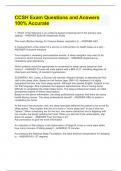
-
CCSH Exam Questions and Answers 100% Accurate
- Exam (elaborations) • 4 pages • 2024
- Available in package deal
-
- $10.99
- + learn more
CCSH Exam Questions and Answers 100% AccurateCCSH Exam Questions and Answers 100% AccurateCCSH Exam Questions and Answers 100% AccurateCCSH Exam Questions and Answers 100% AccurateCCSH Exam Questions and Answers 100% Accurate 1. Which of the following is an evidence-based screening tool in the primary care setting? - ANSWER-Epworth Sleepiness Scale The most effective therapy for Cheyne-Stokes respiration is: - ANSWER-ASV A measurement of the impact of a service or intervention on health s...
![Hesi PRACTICE HEALTHPHYSICAL ASSESSMENT WITH QUESTIONS AND WELL VERIFIED ANSWERS [GRADED A+] ACTUAL 100%](/docpics/5516155/665d5f30c9f16_5516155_121_171.jpeg)
-
Hesi PRACTICE HEALTHPHYSICAL ASSESSMENT WITH QUESTIONS AND WELL VERIFIED ANSWERS [GRADED A+] ACTUAL 100%
- Exam (elaborations) • 23 pages • 2024
-
- $17.99
- + learn more
Hesi PRACTICE HEALTHPHYSICAL ASSESSMENT WITH QUESTIONS AND WELL VERIFIED ANSWERS [GRADED A+] ACTUAL 100% The nurse is performing a neurological assessment on a client and notes a positive Romberg's test. The nurse makes this determination based on which observation? An involuntary rhythmic, rapid, twitching of the eyeballs A dorsiflexion of the great toe with fanning of the other toes A significant sway when the client stands erect with feet together, arms at the side, and the eyes closed...

-
NREMT 2023 Test Questions and Answers All Correct
- Exam (elaborations) • 23 pages • 2023
- Available in package deal
-
- $12.99
- + learn more
NREMT 2023 Test Questions and Answers All Correct Cheyne-Stokes - Answer-abnormal breaths that begin slow and shallow and gradually get faster and deeper with period of apnea Cheyne-Stokes are associated with - Answer-strokes and head injuries and due to damage of the respiratory system -periods of apnea/irregular breaths stridor - Answer-high-pitched indicting upper airway obstruction -can be caused by foreign body or croup wheezing - Answer-lower respiratory problems like asthma ...
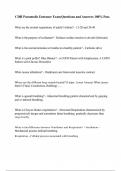
-
CDH Paramedic Entrance Exam Questions and Answers 100% Pass
- Exam (elaborations) • 9 pages • 2024
-
- $9.00
- + learn more
What are the normal respirations of adults? Infants? - 12-20 and 20-40 What is the purpose of surfactant? - Reduces surface tension in alveoli (lubricant) What is the normal stimulus to breathe in a healthy patient? - Carbonic drive What is a pink puffer? Blue Bloater? - A COPD Patient with Emphysema. A COPD Patient with Chronic Bronchitis What causes inhalation? - Diaphragm and Intercostal muscles contract Where are the different lung sounds located? (Upper, Lower Airway) What causes the...
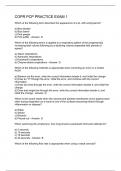
-
COPR PCP PRACTICE EXAM 1
- Exam (elaborations) • 14 pages • 2024
-
- $14.49
- + learn more
Which of the following term describes the appearance of a pt. with emphysema? a) Blue bloater b) Blue barrel c) Pink peeper d) Pink puffer - Answer- D Which of the following terms is applied to a respiratory pattern of the progressively increasing tidal volume following by a declining volume separated with periods of apnea? a) Ataxic respirations b) Apneustic respirations c) Kussmaul's respirations d) Cheyne-stokes respirations - Answer- D Which of the following methods ...
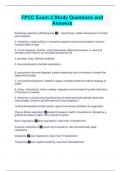
-
FPCC Exam 2 Study Questions and Answers
- Exam (elaborations) • 30 pages • 2024
-
- $10.99
- + learn more
Assessing respiratory effort/dyspnea 1. nasal flaring- visible enlargement of nostrils with inhalation 2. retractions- visible pulling in. caused by negative pressures generated in chest to increase depth of resp. 3. use of accessory muscles- using intercostals, abdominal muscles, or neck and shoulders when there is an increased demand for O2 4. grunting- noisy, difficulty breathing 5. body positioning to facilitate respirations 6. paroxysmal nocturnal dyspnea- sudden awakening ...
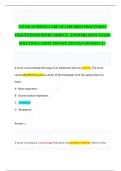
-
ATI RN Nursing Care of Children PROCTORED Questions with Answers
- Exam (elaborations) • 90 pages • 2023
-
- $25.99
- + learn more
ATI RN Nursing Care of Children PROCTORED Questions with Answers A nurse is auscultating the lungs of an adolescent who has asthma. The nurse should identify thesound as which of the following? Click the audio button to listen. A- Biots respiration B- Chaney Stokes respiration C- tackypnea D - Bradypnea Answer- c A nurse is caring for a school-age child who has peripheral edema. Which of the DO NOT COPY followingassessments should the nurse perform to confirm peripheral edema? A- Pal...
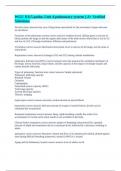
-
WGU D115 patho, Unit 4-pulmonary system || A+ Verified Solutions.
- Exam (elaborations) • 8 pages • 2024
- Available in package deal
-
- $11.09
- + learn more
Alveoli correct answers tiny sacs of lung tissue specialized for the movement of gases between air and blood Functions of the pulmonary system correct answers ventilate alveoil, diffuse gases in and out of blood, perfuse the lungs so that the organs and tissues of the body receive blood that is rich in O2 and low in CO2. (Through ventilation, diffusion and perfusion) Ventilation correct answers Mechanical movement of air in and out of the lungs, not the same as respiration's Respiratio...
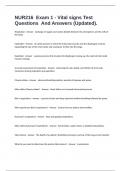
-
NUR216 Exam 1 - Vital signs Test Questions And Answers (Updated).
- Exam (elaborations) • 5 pages • 2024
- Available in package deal
-
- $9.99
- + learn more
Respiration - Answer exchange of oxygen and carbon dioxide between the atmosphere and the cells of the body. Inspiration - Answer An active process in which the intercostal muscles and the diaphragm contract, expanding the size of the chest cavity and causing air to flow into the lungs. Expiration - Answer a passive process that involves the diaphragm moving up, the external intercostal muscles relaxing. Accurate assessment of respiration - Answer observing the rate, depth, and ...
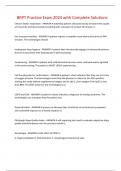
-
BRPT Practice Exam 2024 with Complete Solutions
- Exam (elaborations) • 8 pages • 2024
-
- $12.49
- + learn more
Cheyne-Stokes respiration - ANSWER A breathing pattern characterized by at least three cycyles of crescendo and decrescendo breathing with a duration of at least 10 minutes is: Use oronasal interface - ANSWER A patient reports a complete nasal obstruction prior to PAP titration. The technologist should: Inadequate sleep hygiene - ANSWER A patient that intentionally engages in behavorial patterns that are inconsistent with sleeping well is demonstrating:

$6.50 for your textbook summary multiplied by 100 fellow students... Do the math: that's a lot of money! Don't be a thief of your own wallet and start uploading yours now. Discover all about earning on Stuvia


